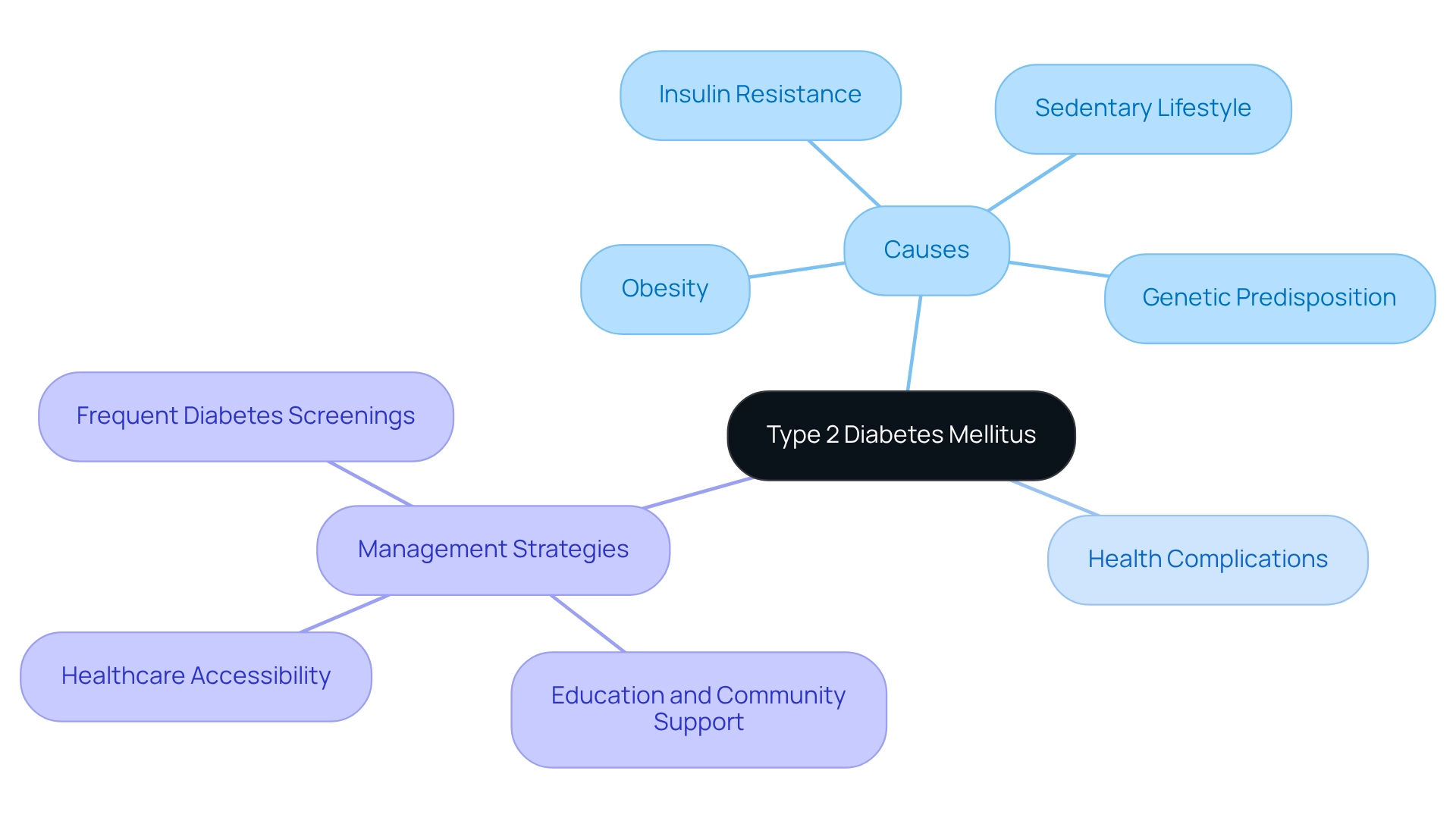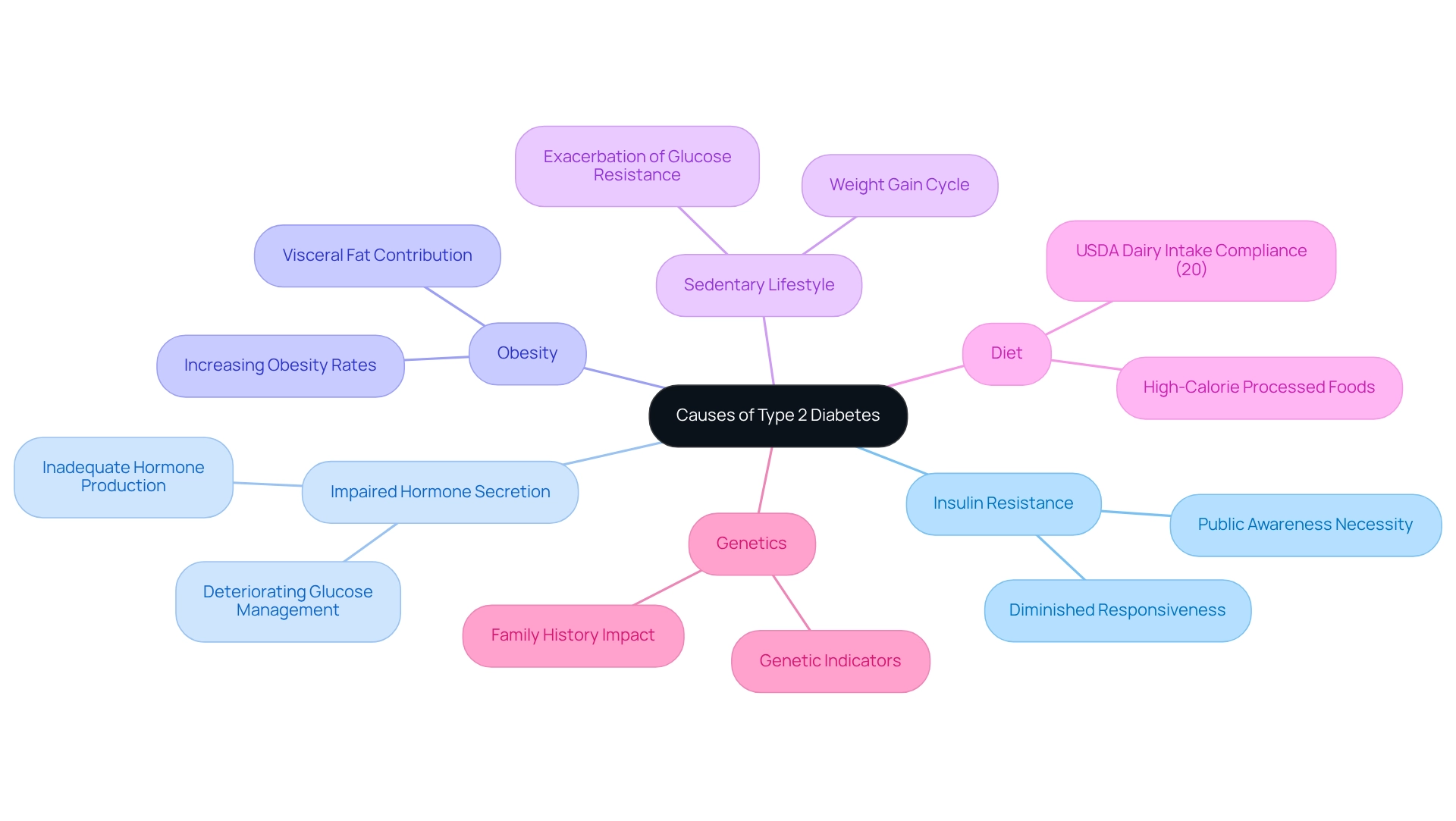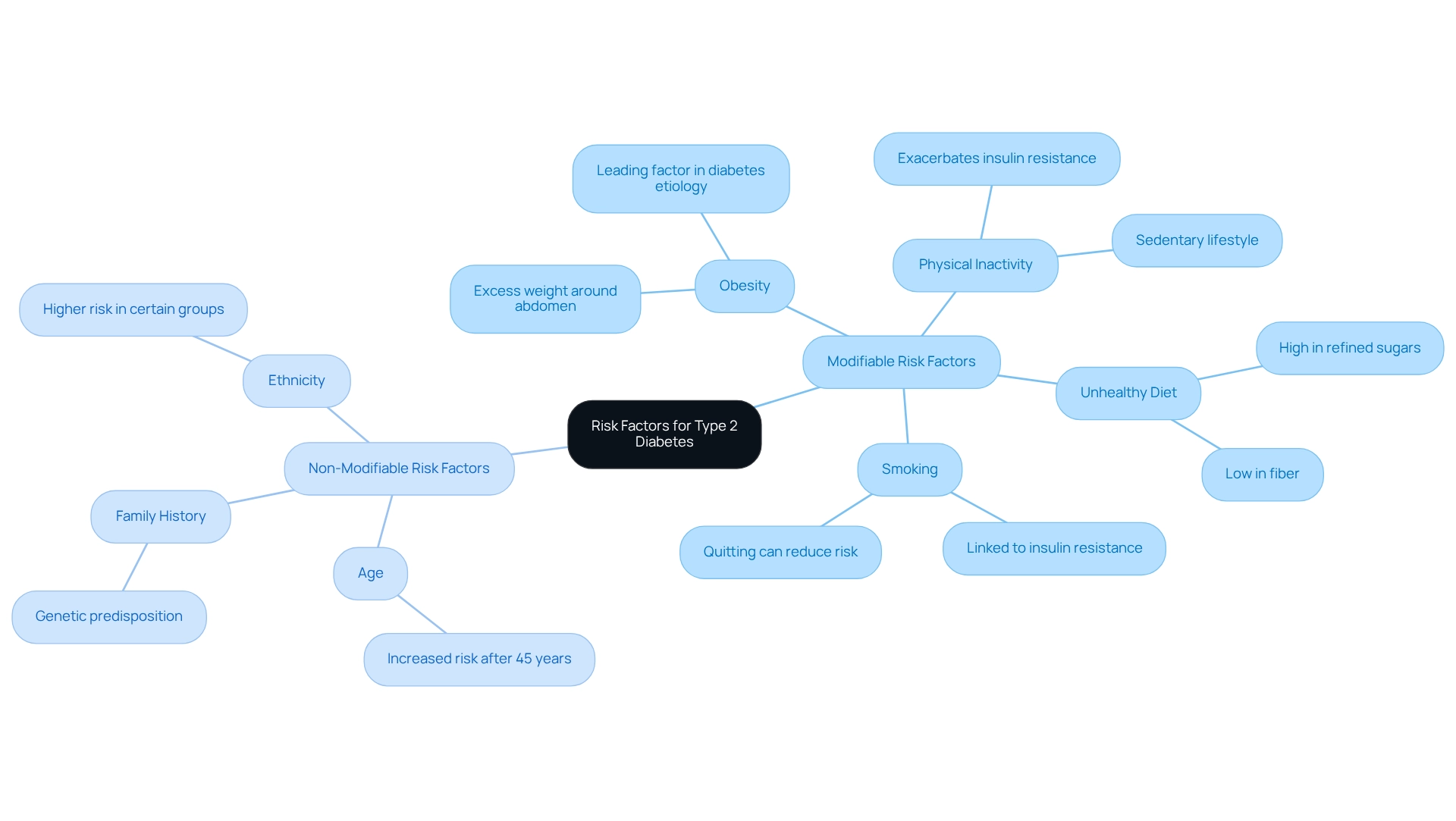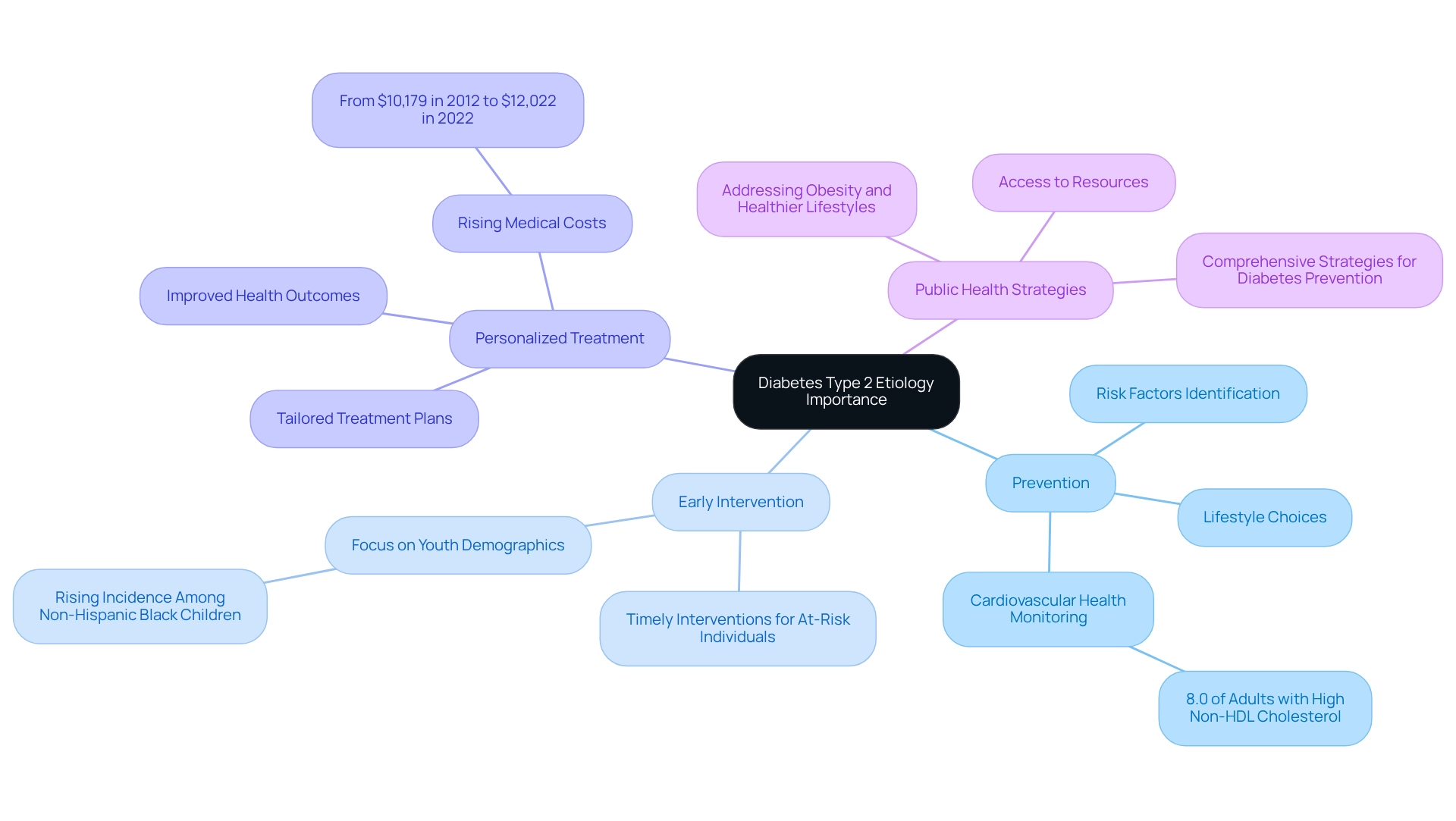Overview
This article highlights the causes and risk factors associated with Type 2 Diabetes Mellitus (T2DM), underscoring the importance of understanding its etiology for effective prevention and management. It's understandable to feel overwhelmed by the information, but recognizing the key contributors—such as:
- Insulin resistance
- Obesity
- Sedentary lifestyles
- Genetic predisposition
can empower you. Awareness of these factors can lead to informed lifestyle choices that significantly improve health outcomes. Remember, you're not alone in this journey; we are here to support you every step of the way.
Introduction
In a world where health challenges are increasingly prevalent, Type 2 Diabetes Mellitus (T2DM) emerges as a significant public health concern. This chronic metabolic disorder, marked by insulin resistance and relative insulin deficiency, affects millions. It is often linked to lifestyle factors such as obesity and inactivity, which can feel overwhelming.
As we deepen our understanding of T2DM, it becomes essential to recognize its causes, risk factors, and implications for health management. You're not alone in this journey; many individuals are navigating similar challenges. With the launch of T2DSolutions, a new resource hub dedicated to diabetes education and community support, you are empowered to take charge of your health.
This article delves into the complexities of Type 2 Diabetes, offering insights into its etiology and risk factors. We will explore the vital role of effective management strategies in combating this growing epidemic. Remember, we are here to support you every step of the way.
Define Type 2 Diabetes: An Overview
Type 2 Diabetes Mellitus (T2DM) is a long-lasting metabolic condition that highlights diabetes type 2 etiology, characterized by insulin resistance and a relative deficiency of this vital hormone. Unlike the first form of the condition, where the body cannot produce insulin, individuals with T2DM can generate insulin, yet their bodies struggle to use it effectively. This inefficiency leads to elevated blood glucose levels, which, if not managed properly, can result in serious health complications associated with diabetes type 2 etiology.
It's important to recognize that T2DM often coexists with factors such as:
- Obesity
- A sedentary lifestyle
- Genetic predisposition
This combination makes it a significant public health concern worldwide. Understanding T2DM is crucial, not only for acknowledging its effects on health but also for emphasizing the importance of effective management strategies.
As we introduce T2DSolutions as a new resource hub, we are committed to empowering individuals with comprehensive education and community support. We understand that being newly diagnosed can feel overwhelming, and we want you to know that you are not alone in this journey. Our goal is to ensure that patients have access to the information and resources they need for effective management, fostering a sense of community and support every step of the way.

Explore the Causes of Type 2 Diabetes
The diabetes type 2 etiology is multifaceted, involving a combination of genetic, environmental, and lifestyle factors. Understanding the causes related to diabetes type 2 etiology is essential for creating effective prevention and treatment approaches. You're not alone in this journey, and we are here to support you every step of the way.
-
Insulin Resistance: This is the primary defect in T2DM, where the body's cells show diminished responsiveness to the hormone, resulting in elevated blood sugar levels. It's understandable to feel concerned about this, as resistance to the hormone is widespread. Research shows that a considerable segment of the population is impacted, highlighting the necessity for public awareness regarding routine health checks and lifestyle changes.
-
Impaired Hormone Secretion: Over time, the pancreas may become incapable of generating adequate hormone to satisfy the body's requirements, especially when resistance is present. Real-life instances demonstrate how this impairment can result in deteriorating glucose management, which can be distressing.
-
Obesity: Excess body fat, particularly visceral fat, is a significant contributing factor for T2DM as it worsens blood sugar sensitivity. Present obesity levels are concerning, as there is a direct connection noted between increasing obesity rates and diabetes type 2 etiology. It’s important to recognize this link and seek support.
-
Sedentary Lifestyle: A deficiency in physical activity not only leads to weight gain but also exacerbates glucose resistance, forming a harmful cycle that can be hard to escape. Remember, small changes can make a big difference.
-
Diet: Diets rich in calories and processed foods are associated with obesity and metabolic issues, further heightening the likelihood of developing T2DM. Significantly, merely 20% of people follow the USDA guidelines for dairy intake, which can contribute to overall wellness. It’s never too late to make healthier choices.
-
Genetics: Family background greatly affects vulnerability to T2DM, with certain genetic indicators recognized as contributing factors. Understanding your family history can empower you to take proactive steps.
T2DSolutions aims to be a comprehensive resource hub for diabetes education and community support, empowering newly diagnosed patients with the knowledge they need to manage their condition effectively. For instance, a case study on metabolic syndrome highlights the relationship between insulin resistance and its implications for health, emphasizing the importance of early detection and intervention. As observed by specialists, tackling these elements together can result in better health outcomes for individuals facing challenges or living with this condition. We encourage you to explore the resources available through T2DSolutions to support your journey in managing diabetes.

Identify Risk Factors for Type 2 Diabetes
Risk factors for developing Type 2 Diabetes can be categorized into modifiable and non-modifiable factors.
-
Modifiable Risk Factors:
- Obesity: Excess weight, especially around the abdomen, significantly contributes to an increased risk of diabetes. A recent study involving 24,225 participants with Type 2 Diabetes highlighted obesity as a leading factor in diabetes type 2 etiology. This correlation is strong across various demographics, reminding us that this is a common struggle.
- Physical Inactivity: It's understandable to feel overwhelmed by a busy lifestyle, but a sedentary routine not only contributes to weight gain but also exacerbates insulin resistance. Regular physical activity is essential for prevention, and even small changes can make a difference.
- Unhealthy Diet: Diets high in refined sugars and low in fiber can lead to obesity and metabolic disturbances. This underscores the importance of balanced nutrition, and there are many resources available to help you make healthier choices.
- Smoking: Tobacco use has been linked to insulin resistance, further elevating the risk of developing diabetes. If you're a smoker, seeking support to quit can be a vital step in protecting your health.
-
Non-Modifiable Risk Factors:
- Age: The risk of Type 2 Diabetes increases with age, particularly after 45 years. It's important to be aware of this as you navigate your health journey.
- Family History: If diabetes runs in your family, you may feel anxious about your own risk. A family history of diabetes significantly raises the likelihood of developing the condition, highlighting the importance of genetic factors in diabetes risk.
- Ethnicity: Certain ethnic groups, including African Americans, Hispanics, and Native Americans, face a higher risk for Type 2 Diabetes. This necessitates targeted awareness and prevention strategies concerning diabetes type 2 etiology, and you are not alone in this challenge.
Recognizing these risk factors is crucial for taking proactive steps in managing your health. For example, a case study on diabetes management demonstrates that effective approaches—including healthy eating, physical activity, and medication adherence—can significantly decrease the likelihood of complications and improve your quality of life. As Dr. Dinesh Kacha emphasizes, addressing the root causes of insulin resistance through lifestyle modifications can not only prevent but potentially reverse diabetes. This highlights the significance of understanding and responding to both changeable and unchangeable factors, ultimately aiding improved management of your condition in the future. Remember, T2DSolutions acts as a valuable resource center, offering education and assistance to help you manage these challenges effectively. You're not alone in this journey; we are here to support you every step of the way.

Understand the Importance of Diabetes Etiology
Understanding the diabetes type 2 etiology is vital for several reasons:
-
Prevention: It's empowering to identify risk factors and causes, as this knowledge allows individuals to make informed lifestyle choices. By doing so, you can significantly reduce your risk of developing T2DM. For instance, recent statistics indicate that 8.0% of adults diagnosed with diabetes had a non-HDL cholesterol level of 190 mg/dL or higher. This emphasizes the significance of monitoring cardiovascular health in relation to diabetes type 2 etiology and prevention.
-
Early Intervention: Understanding the origins of the disease allows healthcare providers to implement timely interventions for those at risk. A notable case study revealed a rising incidence of type 2 diabetes among youth, particularly non-Hispanic Black children. This underscores the urgent need for preventive strategies targeting younger demographics, ensuring that they receive the support they need.
-
Personalized Treatment: A deeper understanding of the underlying causes of T2DM helps in developing tailored treatment plans that cater to individual patient needs. This approach can ultimately improve health outcomes. It's crucial to note that excess medical costs associated with diabetes type 2 etiology have risen significantly, from $10,179 in 2012 to $12,022 in 2022, making personalized care even more important.
-
Public Health Strategies: Insights into diabetes type 2 etiology inform public health initiatives aimed at reducing obesity and promoting healthier lifestyles within communities. Recent discussions emphasize the need for comprehensive strategies that address the multifaceted nature of diabetes prevention, ensuring that everyone has access to the resources they need.
In conclusion, a thorough understanding of diabetes type 2 etiology is essential for effective management and prevention strategies. This leads to improved health outcomes for individuals and communities alike. Remember, you're not alone in this journey; we are here to support you every step of the way.

Conclusion
Type 2 Diabetes Mellitus (T2DM) is not just a medical condition; it represents a complex interplay of genetic, lifestyle, and environmental factors that significantly impact public health. By recognizing the fundamental characteristics of T2DM, such as insulin resistance and impaired insulin secretion, we can better appreciate the importance of proactive health measures. With rising obesity rates and sedentary lifestyles contributing to the prevalence of this condition, awareness and education become paramount.
Understanding the risk factors, both modifiable and non-modifiable, is crucial. By emphasizing the importance of a balanced diet, regular physical activity, and awareness of family history, we can empower ourselves to make informed lifestyle choices. Moreover, grasping the etiology of T2DM opens the door to targeted prevention strategies, early intervention, and personalized treatment plans that cater to our individual needs.
As T2DSolutions emerges as a vital resource hub for diabetes education and community support, it is essential to harness this knowledge and take charge of our personal health management. By actively engaging with available resources, we can navigate the challenges posed by Type 2 Diabetes with confidence. Remember, you’re not alone in this journey. Embracing a proactive approach not only enhances our well-being but also contributes to a healthier community, paving the way for improved health outcomes for all.
Frequently Asked Questions
What is Type 2 Diabetes Mellitus (T2DM)?
Type 2 Diabetes Mellitus (T2DM) is a long-lasting metabolic condition characterized by insulin resistance and a relative deficiency of insulin, leading to elevated blood glucose levels.
How does T2DM differ from Type 1 Diabetes?
Unlike Type 1 Diabetes, where the body cannot produce insulin, individuals with T2DM can produce insulin but struggle to use it effectively.
What are the common factors associated with T2DM?
Common factors associated with T2DM include obesity, a sedentary lifestyle, and genetic predisposition.
Why is T2DM considered a public health concern?
T2DM is a significant public health concern worldwide due to its prevalence and the serious health complications that can arise if not managed properly.
What resources does T2DSolutions provide for individuals with T2DM?
T2DSolutions offers comprehensive education and community support to empower individuals newly diagnosed with T2DM, ensuring they have access to necessary information and resources for effective management.
What is the goal of T2DSolutions?
The goal of T2DSolutions is to foster a sense of community and support for individuals with T2DM, helping them navigate their journey and manage their condition effectively.



